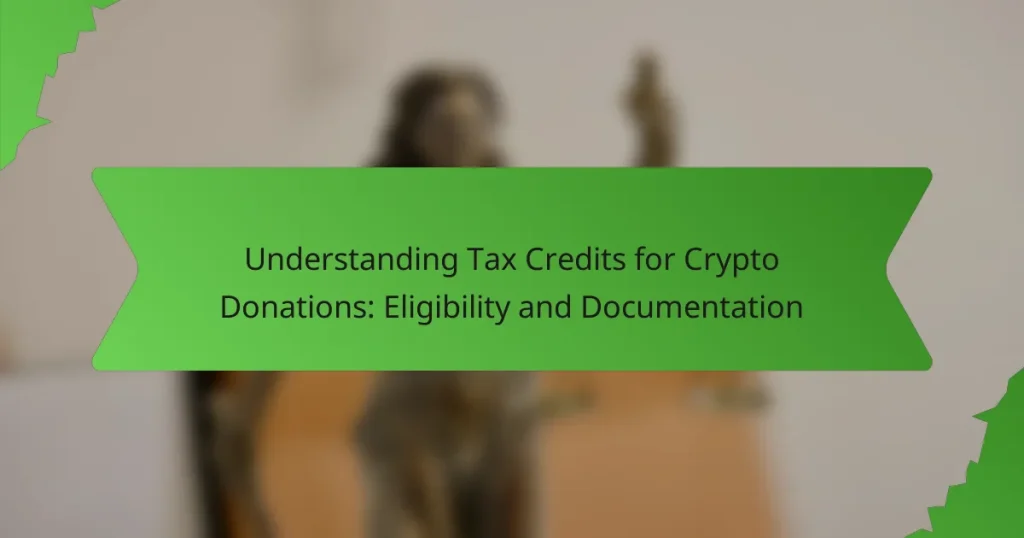Tax credits for crypto donations provide tax benefits to individuals who contribute cryptocurrency to qualified charitable organizations, specifically those recognized as 501(c)(3) entities by the IRS. Donors can deduct the fair market value of the cryptocurrency at the time of donation if they have held the asset for more than one year, contrasting with short-term holdings that allow deductions based on purchase price. Essential documentation, including written acknowledgment from the charity and records of the cryptocurrency’s value, is required to substantiate the donation and ensure eligibility for tax deductions. This overview will cover the criteria for eligibility, necessary documentation, and the implications of these tax credits on charitable giving in the context of cryptocurrency.

What are Tax Credits for Crypto Donations?
Tax credits for crypto donations refer to the tax benefits individuals receive when they donate cryptocurrency to qualified charitable organizations. These credits allow donors to reduce their taxable income based on the fair market value of the donated cryptocurrency at the time of the donation. According to IRS guidelines, donors can claim a tax deduction for the full market value if they held the crypto for more than one year. This is in contrast to short-term holdings, which may only allow deductions based on the purchase price. Charitable organizations typically must be registered 501(c)(3) entities to qualify for these donations. Tax credits can incentivize charitable giving and support the growth of cryptocurrency philanthropy.
How do Tax Credits work in the context of Crypto Donations?
Tax credits for crypto donations allow donors to reduce their tax liability based on the fair market value of the donated cryptocurrency. When individuals donate crypto to qualified charitable organizations, they may claim a tax deduction equivalent to the asset’s fair market value at the time of donation. This applies as long as the crypto has been held for more than one year, qualifying it as a long-term capital gain. If the crypto is sold at a profit, the donor avoids capital gains tax on the appreciated value. The IRS requires proper documentation, including a receipt from the charity and, for donations exceeding $500, Form 8283. This ensures that the donation is recognized for tax purposes.
What are the eligibility criteria for claiming Tax Credits on Crypto Donations?
To claim tax credits on crypto donations, donors must meet specific eligibility criteria. The donation must be made to a qualified charitable organization recognized by the IRS. Donors must hold the cryptocurrency for more than one year before making the donation. The fair market value of the cryptocurrency at the time of donation is used for the tax credit calculation. Donors must obtain a receipt from the charity documenting the donation. If the value of the donated crypto exceeds $500, additional IRS Form 8283 is required. These criteria ensure compliance with tax regulations and maximize potential tax benefits.
How is the value of Crypto Donations determined for Tax Credits?
The value of crypto donations for tax credits is determined based on the fair market value at the time of the donation. Fair market value is defined as the price that the cryptocurrency would sell for on the open market. This value is generally established using reputable exchanges where the cryptocurrency is traded. The IRS requires that donors calculate this value to report it accurately for tax purposes. For example, if a donor gives Bitcoin valued at $5,000 at the time of donation, that amount is used for tax credit calculations. Proper documentation, including transaction records and valuation methods, is essential to substantiate the claimed amount.
Why are Tax Credits important for Crypto Donors?
Tax credits are important for crypto donors because they provide financial incentives for charitable contributions. These credits reduce the overall tax liability for donors, making philanthropy more appealing. By donating cryptocurrency, donors can potentially avoid capital gains taxes on appreciated assets. This can lead to significant tax savings compared to selling the asset and donating cash. Additionally, tax credits can encourage more substantial donations, benefiting both the donor and the recipient organization. According to IRS guidelines, donations of cryptocurrency are treated like donations of property, allowing donors to claim fair market value. This treatment can enhance the financial impact of charitable giving in the crypto space.
What financial benefits do Tax Credits provide to individuals donating cryptocurrency?
Tax credits provide significant financial benefits to individuals donating cryptocurrency. They allow donors to reduce their taxable income based on the fair market value of the donated assets. This means individuals can claim a deduction for the full value of the cryptocurrency at the time of donation. For example, if someone donates cryptocurrency worth $1,000, they can potentially lower their taxable income by that amount.
Additionally, donating cryptocurrency that has appreciated in value can help avoid capital gains taxes. If the cryptocurrency was held for over a year, the donor does not have to pay taxes on the gains that occurred during that time. This can lead to substantial savings compared to selling the asset and then donating cash.
Moreover, tax credits can vary based on jurisdiction, potentially enhancing the financial benefits. For accurate tax benefits, individuals should consult tax professionals.
How do Tax Credits encourage charitable giving in the crypto space?
Tax credits encourage charitable giving in the crypto space by providing financial incentives for donors. These credits reduce the overall tax liability for individuals and corporations who donate cryptocurrencies to qualified charities. When donors contribute crypto, they can often deduct the fair market value of the donation from their taxable income. This deduction can lead to significant tax savings, motivating more individuals to consider crypto donations.
For instance, in the United States, the IRS treats cryptocurrency as property. Therefore, when individuals donate crypto that has appreciated in value, they avoid paying capital gains taxes on the appreciation. This tax benefit can further incentivize donations, as donors can support charitable causes while minimizing their tax burdens.
Data from the National Philanthropic Trust indicates that charitable giving in the crypto space has increased significantly, supported by favorable tax treatment. This trend demonstrates how tax credits effectively encourage more substantial contributions to charitable organizations.

Who is Eligible for Tax Credits on Crypto Donations?
Individuals and organizations that donate cryptocurrency to qualified charitable organizations are eligible for tax credits. This eligibility applies to donations made to 501(c)(3) nonprofit organizations recognized by the IRS. Donors must hold the cryptocurrency for more than one year to qualify for the tax deduction based on the fair market value at the time of donation. Documentation is essential, including a receipt from the charity and proof of the donation’s value. The IRS guidelines clearly outline these requirements for tax deductions on crypto donations.
What types of organizations qualify for receiving Crypto Donations?
Nonprofit organizations, charitable entities, and educational institutions qualify for receiving crypto donations. These organizations must typically be registered as tax-exempt under IRS Section 501(c)(3) in the United States. This designation allows them to accept various forms of donations, including cryptocurrencies. Additionally, religious organizations and foundations can also qualify. According to IRS guidelines, donations to these entities may be tax-deductible for the donor. This tax-exempt status is crucial for attracting crypto donations, as it ensures compliance with tax regulations.
How does the status of the receiving organization affect eligibility for Tax Credits?
The status of the receiving organization significantly affects eligibility for tax credits. Organizations classified as 501(c)(3) nonprofit entities are generally eligible for tax-exempt status. This status allows donors to claim tax deductions for contributions made to these organizations. Conversely, organizations without this classification do not provide the same tax benefits to donors. For example, donations to for-profit entities do not qualify for tax credits. Additionally, the IRS specifies that only contributions to eligible charitable organizations qualify for deductions. Therefore, the receiving organization’s status directly determines the donor’s ability to claim tax credits.
What documentation is needed to prove the eligibility of the receiving organization?
The documentation needed to prove the eligibility of the receiving organization includes a valid tax-exempt status letter. This letter is typically issued by the IRS, confirming the organization’s status as a 501(c)(3) entity. Organizations must also provide their Employer Identification Number (EIN) for verification. Additionally, the organization should have its mission statement and bylaws available. These documents outline the purpose and governance structure of the organization. Proof of registration with the state as a nonprofit entity may also be required. This ensures compliance with local regulations. Collectively, these documents establish the organization’s eligibility for receiving tax-deductible donations.
Are there specific requirements for donors to claim Tax Credits?
Yes, there are specific requirements for donors to claim tax credits. Donors must provide documentation of their donation, including a receipt from the charitable organization. The donation must be made to a qualified tax-exempt organization as defined by the IRS. Donors should also ensure that the value of the donation is accurately assessed, particularly for non-cash contributions like cryptocurrency. Additionally, donors need to itemize deductions on their tax returns to benefit from the tax credits associated with their donations.
What documentation must donors maintain to support their claims for Tax Credits?
Donors must maintain specific documentation to support their claims for tax credits. This includes receipts or written acknowledgments from the charitable organization. These documents should detail the donation amount and date. Donors should also keep records of the fair market value of the donated asset. If the donation exceeds $250, a written acknowledgment is mandatory. For non-cash donations, Form 8283 may be required for amounts over $500. Accurate and complete documentation is crucial for substantiating tax credit claims. This ensures compliance with IRS regulations and facilitates the claiming process.
How can donors ensure compliance with IRS guidelines when donating cryptocurrency?
Donors can ensure compliance with IRS guidelines when donating cryptocurrency by following specific steps. First, they should obtain a qualified appraisal if the donation exceeds $5,000. This appraisal must be conducted by a qualified appraiser. Second, donors must complete IRS Form 8283 for non-cash charitable contributions. This form requires detailed information about the donation and the charity. Third, it is essential to keep accurate records of the transaction, including the date, amount, and value of the cryptocurrency at the time of donation. Additionally, donors should ensure that the receiving charity is a qualified organization under IRS rules. Following these steps helps donors meet IRS requirements and avoid potential penalties.

What Documentation is Required for Tax Credits on Crypto Donations?
Tax credits for crypto donations require specific documentation. Donors must obtain a written acknowledgment from the charity receiving the donation. This acknowledgment should include the charity’s name, the date of the donation, and a description of the donated cryptocurrency. If the donation exceeds $250, this acknowledgment is mandatory for tax purposes. Additionally, donors should maintain records of the fair market value of the cryptocurrency at the time of donation. This value is essential for calculating the tax credit. The IRS also recommends keeping transaction records from the cryptocurrency exchange. These records can substantiate the donation amount and the donor’s basis in the cryptocurrency.
What types of records should donors keep for Tax Credit claims?
Donors should keep detailed records of their contributions for Tax Credit claims. These records include receipts or acknowledgment letters from the charitable organization. The documentation should specify the date of the donation and the amount contributed. If the donation involves non-cash assets, donors must document the fair market value at the time of the donation. Keeping bank statements showing the transaction can also be beneficial. Additionally, donors should maintain any correspondence with the charity regarding the donation. Accurate record-keeping helps ensure compliance with IRS requirements for tax deductions.
How do donors document the fair market value of their crypto donations?
Donors document the fair market value of their crypto donations by referencing the cryptocurrency’s value at the time of the donation. They typically use a reliable exchange rate from a recognized cryptocurrency exchange. This value is determined based on the average price on the date of the donation. Donors should keep records of the transaction, including the date, amount, and exchange used. Additionally, they can refer to IRS guidelines for reporting non-cash charitable contributions. Accurate documentation is crucial for claiming tax deductions. Maintaining this documentation ensures compliance with tax regulations and supports the fair market value claimed.
What specific forms must be filed when claiming Tax Credits for Crypto Donations?
To claim tax credits for crypto donations, you must file IRS Form 8283. This form is specifically for non-cash charitable contributions. Additionally, if the donation exceeds $500, you need to provide details about the donation and the charity. If the value of the donation is over $5,000, a qualified appraisal is also required. This ensures that the IRS can verify the value of the crypto donation. Proper completion of these forms is essential for compliance with tax regulations.
How can donors effectively prepare their documentation for Tax Credit claims?
Donors can effectively prepare their documentation for Tax Credit claims by organizing all relevant records. This includes receipts for donations, which should clearly state the date, amount, and recipient organization. Donors should also keep records of the fair market value of donated assets at the time of the donation. For crypto donations, transaction history from the wallet can serve as proof of the donation. Additionally, a letter from the nonprofit acknowledging the donation can be beneficial. It is essential to ensure that all documents are accurate and complete to avoid issues during tax filing. Following IRS guidelines on charitable contributions can further enhance the effectiveness of documentation.
What best practices should be followed when compiling documentation for Tax Credits?
Compile documentation for tax credits by following several best practices. First, ensure all records are accurate and complete. This includes receipts, invoices, and any relevant financial statements. Next, maintain organized files categorized by type of credit. This improves retrieval during audits. Use digital tools for tracking and storing documentation securely. Additionally, document the date and amount of each transaction. Keep records for at least three years, as required by the IRS. Finally, consult IRS guidelines specific to tax credits to ensure compliance. These practices help maximize the chances of successfully claiming tax credits.
How can donors avoid common pitfalls in documentation for Crypto Donation Tax Credits?
Donors can avoid common pitfalls in documentation for Crypto Donation Tax Credits by maintaining accurate records. They should document the fair market value of the cryptocurrency at the time of donation. This value is essential for tax reporting. Donors must also keep receipts from the charitable organization. These receipts should confirm the donation and include the organization’s tax-exempt status. Furthermore, donors should ensure that they provide detailed descriptions of the cryptocurrencies donated. This includes the type and amount of cryptocurrency. It’s also important to consult with a tax professional for compliance. This practice helps to navigate complex regulations and ensures proper documentation. Following these steps can significantly reduce the risk of issues during tax filing.
What are the best strategies for maximizing Tax Credits on Crypto Donations?
To maximize tax credits on crypto donations, consider donating directly to qualified charities. This allows you to deduct the fair market value of the crypto at the time of donation. Hold the crypto for over a year before donating. This strategy helps you avoid capital gains taxes on appreciated assets. Ensure the charity is a registered 501(c)(3) organization to qualify for tax deductions. Keep detailed records of the donation, including the date, value, and the charity’s information. Utilize IRS Form 8283 for non-cash donations over $500. Consulting a tax professional can provide tailored strategies for your specific situation.
Tax credits for crypto donations represent the tax benefits available to individuals who contribute cryptocurrency to qualified charitable organizations. This article covers the eligibility criteria for claiming these tax credits, the process of determining the fair market value of donations, and the necessary documentation required for compliance with IRS guidelines. It also highlights the financial advantages of donating cryptocurrency, such as avoiding capital gains taxes, and outlines best practices for maximizing tax credits. Understanding these aspects is crucial for donors looking to navigate the intersection of cryptocurrency and charitable giving effectively.




